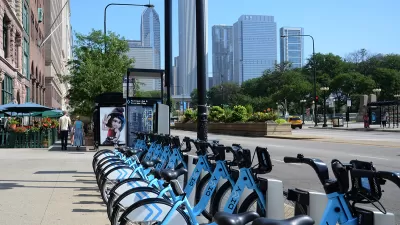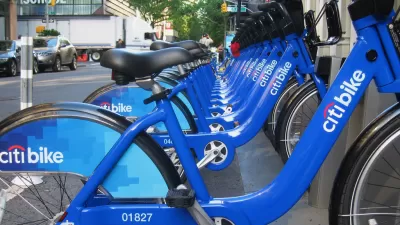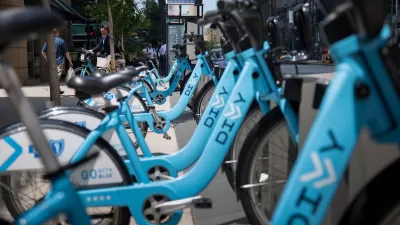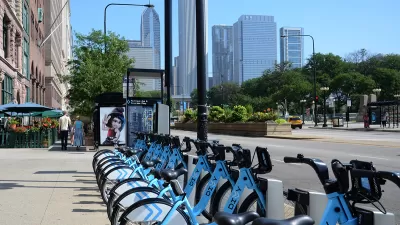A sponsorship deal from Lyft, which owns the bike share provider Motivate, would expand Divvy bike service to every ward in Chicago.

The new Divvy contract may dramatically increase the reach of the service. "Under the proposed amendment, Lyft would expand the system to all 50 wards by 2021, adding 10,500 bikes and 175 stations. That would bring the total to about 16,500 bikes and 800 stations," writes John Greenfield. To achieve the expansion, Lyft would make a financial investment of $50 million. Currently, Divvy service is available in the city center and many, but not all, of the city's neighborhoods, meaning riders cannot drop of bikes in all of the city’s neighborhoods.
Beyond the expansion of service, the deal would also restructure the financial aspects of the service. "Additionally, the city asserts, the amendment would restructure the financial terms of the contract to 'dramatically' increase annual guaranteed revenues and reduce financial risk to the city," Greenfield reports. Divvy profits would go back to Divvy and the city would be paid an agreed-upon rate each year, and in exchange the city would receive a fixed amount of funding that it could budget against.
FULL STORY: Lyft May Spend $50M to Expand Divvy to All Wards, Using Dockless-Option eBikes

Planetizen Federal Action Tracker
A weekly monitor of how Trump’s orders and actions are impacting planners and planning in America.

Map: Where Senate Republicans Want to Sell Your Public Lands
For public land advocates, the Senate Republicans’ proposal to sell millions of acres of public land in the West is “the biggest fight of their careers.”

Restaurant Patios Were a Pandemic Win — Why Were They so Hard to Keep?
Social distancing requirements and changes in travel patterns prompted cities to pilot new uses for street and sidewalk space. Then it got complicated.

Platform Pilsner: Vancouver Transit Agency Releases... a Beer?
TransLink will receive a portion of every sale of the four-pack.

Toronto Weighs Cheaper Transit, Parking Hikes for Major Events
Special event rates would take effect during large festivals, sports games and concerts to ‘discourage driving, manage congestion and free up space for transit.”

Berlin to Consider Car-Free Zone Larger Than Manhattan
The area bound by the 22-mile Ringbahn would still allow 12 uses of a private automobile per year per person, and several other exemptions.
Urban Design for Planners 1: Software Tools
This six-course series explores essential urban design concepts using open source software and equips planners with the tools they need to participate fully in the urban design process.
Planning for Universal Design
Learn the tools for implementing Universal Design in planning regulations.
Heyer Gruel & Associates PA
JM Goldson LLC
Custer County Colorado
City of Camden Redevelopment Agency
City of Astoria
Transportation Research & Education Center (TREC) at Portland State University
Camden Redevelopment Agency
City of Claremont
Municipality of Princeton (NJ)





























